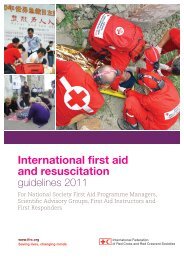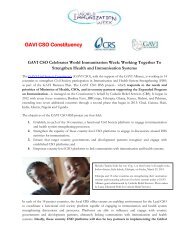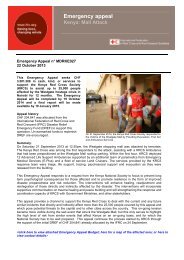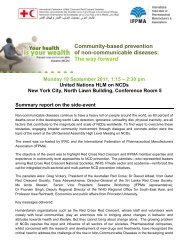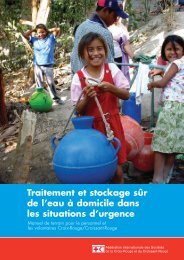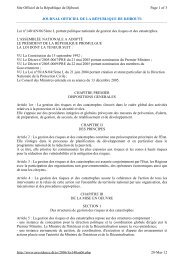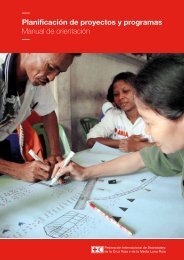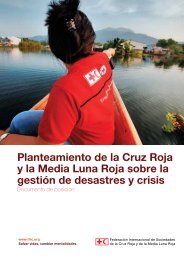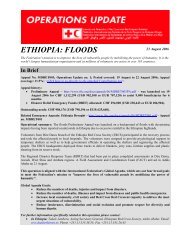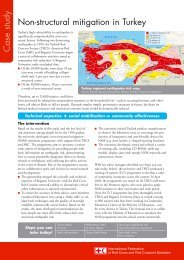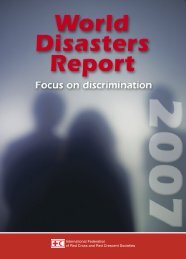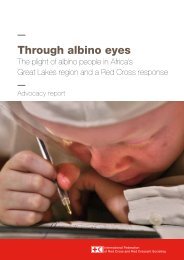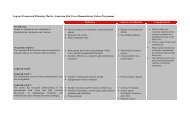World Disasters Report 2010 - International Federation of Red Cross ...
World Disasters Report 2010 - International Federation of Red Cross ...
World Disasters Report 2010 - International Federation of Red Cross ...
Create successful ePaper yourself
Turn your PDF publications into a flip-book with our unique Google optimized e-Paper software.
to peak if the planet is to have a chance <strong>of</strong> limiting temperature increase to between<br />
2 and 2.4 degrees Celsius. The general acceptance by the G8 <strong>of</strong> a 2 degrees Celsius<br />
ceiling may still be too much for many coastal cities’ defences and this needs to be<br />
recognized sooner rather than later when it comes to investment in disaster risk reduction.<br />
Entrenched dichotomies between climate change adaptation and disaster risk<br />
reduction need to be dismantled long before then to enable a focus on building urban<br />
resilience. The <strong>International</strong> <strong>Federation</strong> <strong>of</strong> <strong>Red</strong> <strong>Cross</strong> and <strong>Red</strong> Crescent Societies for<br />
example, in its Strategy 2020, addresses climate change adaptation “through scaling up<br />
disaster risk reduction measures and strengthening traditional methods <strong>of</strong> coping with<br />
disasters that are relevant in particular environmental contexts”.<br />
Climate change will have both a quantitative and a qualitative impact on the risks<br />
facing urban areas in coming decades. In particular, the inability to predict future<br />
emissions scenarios and the lack <strong>of</strong> precise knowledge about the impacts that these<br />
will have on the global climatic system means that urban residents and authorities will<br />
have to deal with an increasing level <strong>of</strong> uncertainty around the frequency and intensity<br />
<strong>of</strong> extreme weather events. Many countries still have some way to go in order to catch<br />
up with reality: a WMO survey in 2006 showed that more than 60 per cent <strong>of</strong> its 189<br />
members are inadequately equipped to warn populations against hazards, particularly<br />
in most vulnerable countries. It seems remarkable that it was only in April <strong>2010</strong> that<br />
30 ministers in charge <strong>of</strong> meteorology in Africa met for the first time under the auspices<br />
<strong>of</strong> WMO and the African Union, given that Africa is so poorly equipped to deal<br />
with climate change at both urban and rural levels.<br />
When combined with increasing levels <strong>of</strong> urbanization and ongoing social and environmental<br />
problems in towns and cities, risk and vulnerability for many urban residents<br />
are likely to be exacerbated. The impacts <strong>of</strong> climate change will be distributed<br />
unevenly within urban populations, with low-income groups being particularly vulnerable<br />
due to their greater exposure to hazards and their lower levels <strong>of</strong> adaptive<br />
capacity. A focus on building resilience to cope with uncertainty, rather than applying<br />
solutions based on specific scenarios, is therefore the best way <strong>of</strong> protecting the lives<br />
and livelihoods <strong>of</strong> urban residents.<br />
The actions taken by urban authorities, civil society organizations and humanitarian<br />
agencies in urban areas can make a substantial difference to the ability <strong>of</strong> towns and<br />
cities – and their residents – to respond to disasters and climate change. For city<br />
dwellers in low-income and many middle-income countries, the biggest single issue is<br />
the infrastructure deficit – the inability <strong>of</strong> urban systems to deal with current climate<br />
variability. Many <strong>of</strong> the hazards and risks facing cities as a result <strong>of</strong> climate change are<br />
modifications to existing hazards and risks – and cities that are unable to deal with<br />
the challenges <strong>of</strong> today will be unable to deal with the new climate challenges <strong>of</strong> the<br />
future. Improved planning for disaster risks, including better short-term forecasting<br />
<strong>of</strong> shocks, is therefore also a key component for responding to climate change. At the<br />
<strong>World</strong> <strong>Disasters</strong> <strong>Report</strong> <strong>2010</strong> – Focus on urban risk<br />
133



